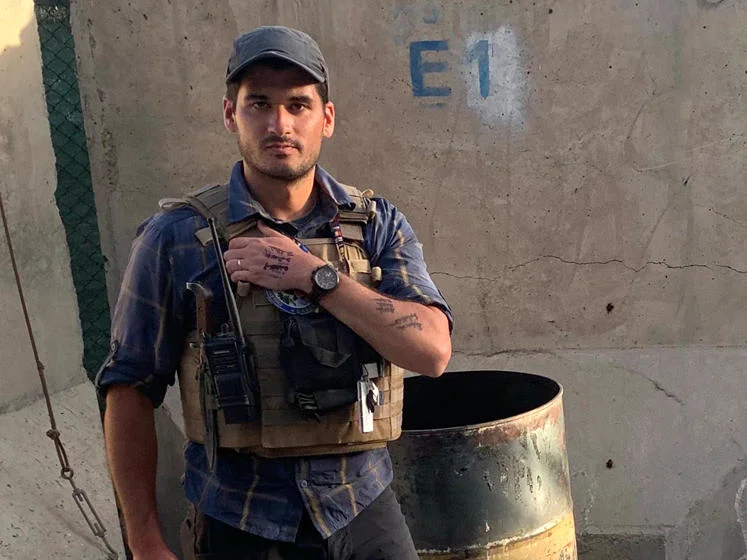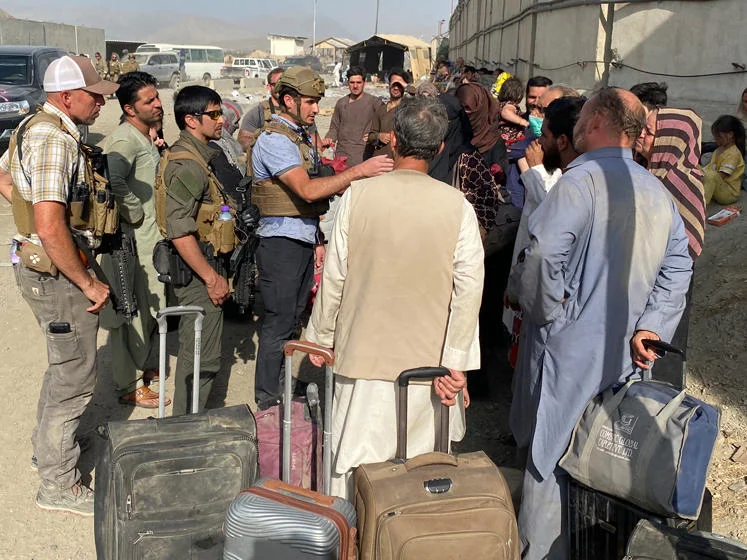Doing the right thing when nobody is watching

Samuel Aronson (MSc Government 2013) tells us how he came to save 70 people during the US evacuation from Afghanistan
From LSE to the US State Department
This story began on the second floor of the New Academic Building when I took a call from a mentor who suggested I apply for an analyst position with the State Department. A few months into that role, I applied to become a foreign service officer (a diplomat) or a special agent in the State Department’s Diplomatic Security Service. I was offered the special agent role and served first at the U.S. Mission to the United Nations and then with the US embassy regional security office in Niamey, Niger. However, I felt my academic background and interests were better suited to be a diplomat, so I changed careers and was sworn in as a foreign service officer in 2019. My first diplomatic position was as the staff aide to the US Ambassador in Abuja, Nigeria.
The Decision
My decision to volunteer in Afghanistan was somewhat accidental. I was on vacation between overseas postings when I saw the harrowing image of that C-17 military aircraft taking off from Kabul Airport with bodies falling from the sky. I felt the need to help and emailed a senior official at the State Department, offering to answer phones on a task force at headquarters. I received a phone call an hour later asking if I could be on a flight to Doha, Qatar later that same day. On my way to the airport, I received a message that I was booked for a military flight to Kabul. Up to that point, I had no idea we were still sending personnel into Afghanistan. I was scared and felt underqualified, but once I arrived, I knew there was no shortage of work that needed to be done.

Arriving in Afghanistan
Kabul looked apocalyptic. I’ve been to refugee camps in Kenya, Nigeria and Somalia, but this was like nothing I have ever seen. Thousands of desperate civilians who had given up everything in hopes for a chance to leave their homeland. Women, men and children desperately needed our help. The situation was tense, and we were constrained by having only a small number of diplomats and a genuine risk of being attacked by ISIS. One of the first things I was taught after arrival was how to hotwire cars and buses. When American forces and diplomats were airlifted into the airport a few days prior, nobody had keys to the vehicles at the airport. That meant we needed to be creative.
The Glory Gate Evacuation
My idea for the Glory Gate evacuation plan happened when I was asked in the early hours of Thursday, 26 August 2021 to assist a senior diplomat with a secret plan to bring more than 1,000 local Afghan staff from our US embassy into the airport in coaches. To evade Taliban checkpoints, we had arranged with the CIA to use a hidden-in-plain-sight gap in the wall on the outskirts of the Kabul Airport. One of the Afghan embassy employees on the first bus to arrive that day pleaded with me to help his 17-year-old brother. Despite being his brother’s caretaker, he was not allowed to bring his brother with him. He handed me his cell phone, and the bus drove away. I called up a young interpreter I’d met several days prior and we concocted a plan to grab the brother from a petrol station across the street. With help from the CIA and US special operations forces, we brought him to safety. I knew there was no turning back, and we continued rescuing people for the rest of the day using various iterations of that original plan. Just before 5pm, we got word that a suicide attack was imminent, so we returned to the airport. About 30 minutes later, a suicide bomber tragically killed 13 brave US service members and more than 170 Afghan civilians at the nearby Abbey Gate.
On foot in these petrol station rescues, I saved around 60 people on the Thursday and another 10 the following night. I also facilitated entry at Glory Gate to more than 1,000 people on buses, which sounds easier and less glamorous, but it was incredibly challenging sneaking in coach buses without the nearby Taliban realising what we were doing.

Looking back
Nobody really knows what they’d do when faced with a situation like that. I want to think that most people would do the same thing as me, though they probably do a better job at it than I did. My parents taught me from a young age that "integrity is doing the right thing when nobody is watching." In some ways, the entire world was watching me during those harrowing days in Kabul. But in another way, this was a covert operation hidden in plain sight. Winston Churchill said that, during wartime, the truth is so precious that it needs to be surrounded by a bodyguard of lies. That’s what we did. A very small group of people were aware, but we had to protect the truth of what we were doing because any new person who found out might have stopped us because our plans didn’t always fit the rules, and we were pushing the limits of safety.
I encourage my fellow LSE alumni to be bold and take calculated risks, and to not shy away from challenges. I know that’s easy for me to say after the fact, but these traits are qualities my LSE professors and classmates prepared me well for.
Samuel Aronson (MSc Government 2013)
Sam's full story in Afghanistan has been told in the new book, The Secret Gate, by Mitchel Zuckoff.
June 2023